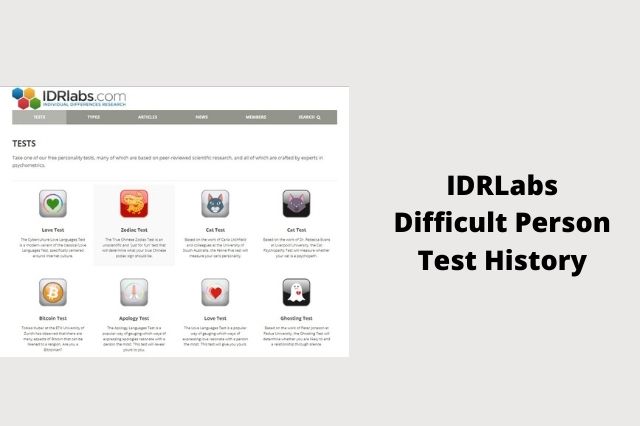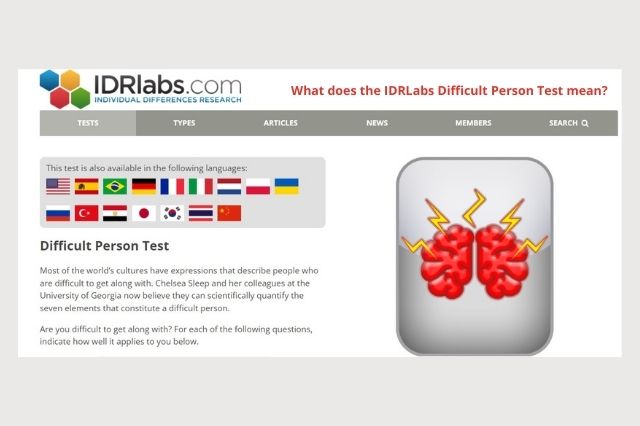Are you Looking for a Difficult Person Test? You’ve come to the right place. Continue reading to find out.
I’m sure you’re all familiar with IQ tests and quizzes, the vast majority of which are available online. Do you understand the meaning of a difficult personality test or what a difficult personality test is?
Many cultures throughout use various methods to assess how tough personality types are. IDRLabs Difficult Person Test is one such structured examination. Chelsea Sleep and her group at the University of Georgia were the pioneers in bringing it to life for the first time.
Does that intrigue your curiosity? I’m sure it does, and your mind is thinking about how you might learn more about this challenging test. So remain with us and read to the end to understand it more.
IDRLabs Difficult Person Test History

It’s essential to understand the origins of the IDRLabs Challenging Individual Quiz. Under the supervision of Ph.D. scholar Dr. Chelsea Sleep and her team, the IDRLabs created this test for the first time. They were looking at antagonistic structure; the IDR difficult person quiz is unrelated to any particular psychology subject.
Dr. Sleep references the difficult personality test in one of her thesis papers.
Reading: Ampleo: CFO And Strategic Financial Solutions Services
What is the Structure of a Difficult Person Test?
The IDRLabs difficult personality test has a straightforward structure. Thirty-five questions are based on various characteristics of your personality.
Additionally, there are just two possible responses to each question: Agree or Disagree. You must understand the text and choose an answer based on your perspective. The difficulty test will give you a result once you have answered all thirty-five questions.
What does the IDRLabs Difficult Person Test mean?
Experts created personality tests based on peer study to solve a powerful objective. For instance, an emotional intelligence test assesses a person’s power to control their own and others’ feelings.

Similarly, you may use a difficult personality test for various purposes. In order to learn why you should utilize the IDRLabs difficult personality test, read the key essentials below.
Clinically Focused
The difficult person test is a scientifically validated tool for determining a respondent’s standardized findings. The test’s layout somehow matches Dr. Sleep’s and her coworkers’ Ph.D. research.
Free
There is no need to join up or register for the IDRLabs Difficult Person Test. You may attempt the test for free and obtain outcomes in the categories of pomposity, antagonism, pre-eminence, risk-taking ability, etc. There isn’t even a clear plan to verify the outcomes. Everything is free from the start to the conclusion of the test.
Designed by Professionals
The structure and layout of the Challenging Individual Quiz incorporate multiple skilled psychologists’ and investigators’ conceptual components.
Statistical Calculations
The assessment of the test is statistical. As a consequence, the quantitative test findings are precise and trustworthy.
How can the Difficult Person Test help in Clinical Psychology?

The difficult person test relies on minute and in-depth information; for assessing several characteristics inside a person. Dr. Sleep’s research examined a range of criteria that might help to classify difficult people.
Although the creation of this test was for educational objectives, the concept is useful in clinical psychology.
It is used by several professional psychiatrists when treating patients. The Difficulty Test Theorem is unaffected by connections, organizations, or scientists.
What is the Process of taking the Difficult Personality Test?
You can find the difficult personality test at this link – https://www.idrlabs.com/difficult-person/test.php
You can go straight to their website and answer the thirty-five questions; to get the results.
Frequently Asked Questions
What is meant by the difficult person test?
A difficult person test is a combination of psychological personality questions. You can attempt this test to determine your level of compassion, tolerance, agreement, and sociability. Dr. Sleep and her colleagues used the initial tests on the assessments to identify psychological issues.
Is the difficult person test valid?
The design of the difficult person test is founded on a prolonged and thorough study of a variety of people’s behavioral aspects. People that pass this test and get excellent grades are considered challenged.
Online tests, such as this one for a difficult person, are free and do not offer reliable findings for personal attributes. The difficulty test is well-known in education and clinical psychology despite the difficulty.
What is the purpose of IDRlabs?
IDRLabs is a company that creates individualized personal assessments for individuals. IDRLabs Difficult Person Test is another name for it. They are designed to identify each person’s personality characteristics. According to the end-to-end study, the questions in the tests comprise scientific and peer-reviewed inquiries. The difficult person quizzes from IDRLabs allow people to uncover their true identities.
Does the difficult person test show accurate results?
The difficult person test is based on a well-known and respected study on the characteristics of complex individuals. Free online tests like this are only good for the first time and cannot give reliable assessments of your attributes. As a result, you can use the test for educational reasons.
What is meant by a difficult person in a difficult person test?
Persons are ‘difficult’ because they have unique personal attributes or emotional characteristics that make communication challenging. The ability to effectively deal with difficult people while maintaining a healthy working atmosphere is referred to as a skill for dealing with complex people. Whether it’s a neighbor, close relative, coworker, student, customer, or supplier, you’re bound to come into touch with a complex individual at some point in your life. Their difficulty level varies depending on the sort of unique person they are: depressants, better than, cooldowns, or tanks.
What are the traits of a Difficult Person?
Following are the 7 traits of a Difficult Person:
1. Aggressiveness
2. Risk-taking
3. Callousness
4. Suspicion
5. Manipulativeness
6. Dominance
7. Grandiosity
Am I a Difficult Person?
If you are devoid of empathy, compassion, or concern for others. If you are always thinking that you are superior to everyone else. other than that if you seem unapproachable to others. If you have this type of personality, you may be a difficult person.
Conclusion – Is the difficult person test still the most effective?
To sum up, every individual should attempt the difficult person test or difficulty test once in their life. Human psychology and qualities are complicated. No study has been able to identify them.
The Challenging Individual Quiz does not promise accuracy. However, user feedback indicates that it is precise and efficient in many circumstances. Mental health experts can benefit from a mental health evaluation or personality assessment using this sort of test. If you want to look at the difficult person test, we have provided you with a link above.
Should I take a difficult Person test?
It all depends on what you want to accomplish. Personality tests may be entertaining and useful in helping you a better understanding of your personality or some other personality.
Dr. Ramani, a clinical psychologist said in Well+Good “At some level, knowing where you fall on that scale might show you some vulnerabilities,”.
The exam is free and short. Although the test does not give you accurate results it can give you some kind of warning. According to IDR lab, the exam is purely made for educational purposes.












Leave a Reply